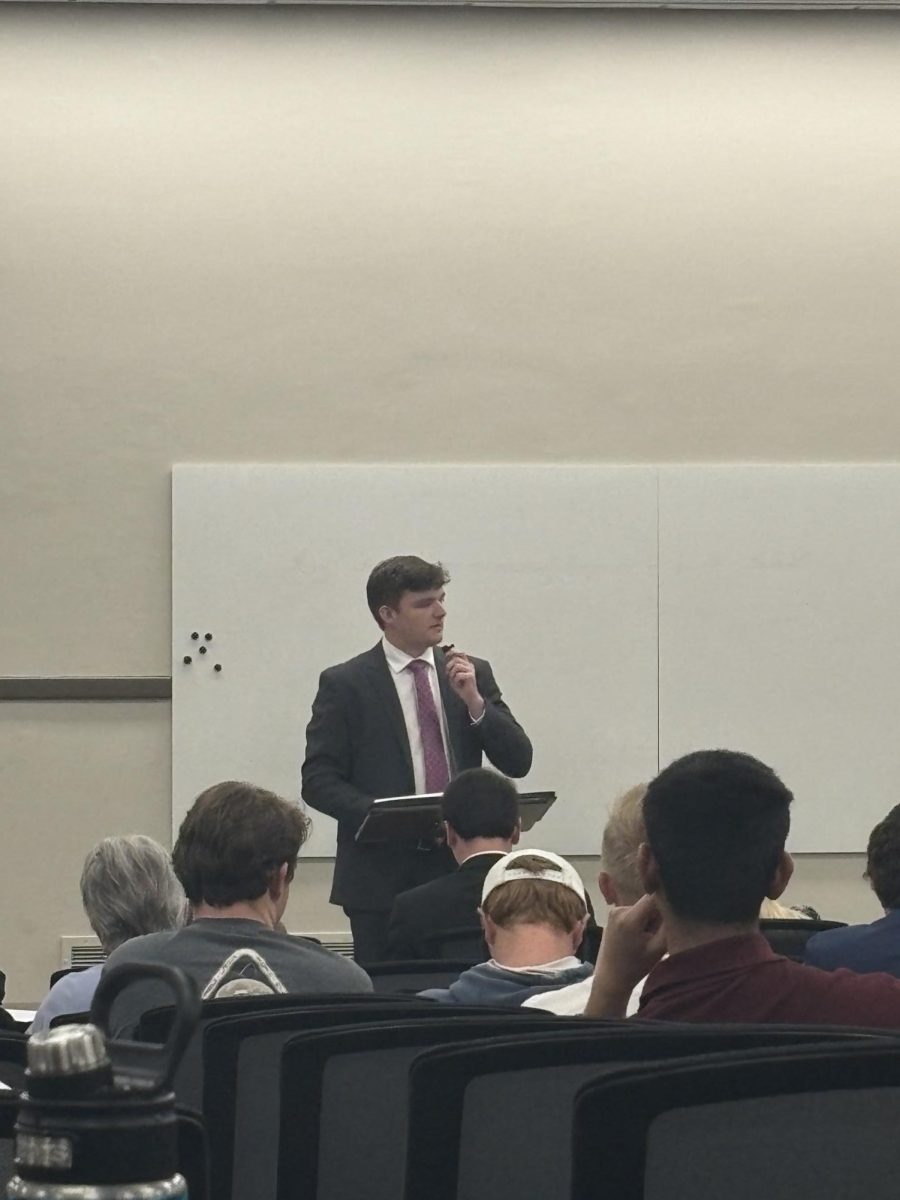Common Ground, a student organization for students with opposing political beliefs to find common understandings, held a debate on Friday where the UA College Republicans and Democrats switched sides and defended the opposing party’s beliefs.
The debate consisted of three students from both parties debating the issues of the Department of Government Efficiency, the Department of Education and the economy.
“We live in a time where not everybody’s extremely comfortable sharing their ideas and their feelings and what they truly believe,” said Jason Odom, president of Common Ground. “Events like this, and getting to work with incredible people like this, spread a stronger message of knowing that you can agree to disagree with one another, and that’s all right.”
Each side and Common Ground selected a judge before the debate. UA College Republicans chose Annie Meissner, Alabama Republican Party director of events and finance. UA College Democrats chose Linda Crowder, chair of the Tuscaloosa County Democrats LGBTQ+ Caucus, and Common Ground chose Marissa Grayson, a UA political science professor.
The debate kicked off with discussion about the Department of Government Efficiency. During the 2024 election, the proposal for DOGE drew criticism, with opponents warning that using private sector efficiency models in government could weaken public services and neglect vulnerable populations. After President Donald Trump took office, he appointed Elon Musk to lead it.
Crowder first asked the debaters if they “believe this groundbreaking role should be encouraged as the role of reform, or scrutinized as a potential threat to the Democratic law.
Christian Martin, UACD political coordinator, responded to this question by comparing the government to a steak. “America wants their government to be like a fine ribeye steak, lean, quality, and efficient,” he said. “What we’re doing with the Department of Government Efficiency is butchering that government down to USDA prime.”
Luke Mintz, UACR vice chair, replied by discussing the secrecy of DOGE.
“The American people are entitled to the records of any agency in the federal government. Instead of classifying DOGE as an agency, he’s intentionally formed it as a task force in the executive office,” Mintz said. “Part of President Trump’s scheme to avoid accountability is to keep Musk as an advisor and not department head, but his role is leading one of the most influential government entities.”
The debate then moved on to the Department of Education, which Trump has moved to close through a recent executive order, arguing that authority over education, which local governments, states and the federal government all share, should be returned to the states.
When discussing his proposed bill to abolish the department, Rep. Jim Banks of Indiana criticized the department, noting that the average employee there earns twice as much as an Indiana teacher, despite the country’s declining test scores. He argued that those funds would be better used if returned to the states, allowing parents, teachers and local officials more control.
“How do you feel sending education back to the states will both positively and negatively impact our students?” Grayson asked the debaters.
Samuel Underhill, a junior economics major arguing for UACR, compared the Department of Education to a house.
“When you manage a house and something’s wrong with it, you go down to the hardware store, you get some tools, and you fix up the house. You don’t go down to the hardware store, get five boxes of TNT and blow up the house,” he said. “There’s no use left in the house if you blow it up. It’s the same reason why we should preserve the Department of Education.”
Samantha Hoefs, a junior history and philosophy double major, responded to the house analogy.
“The Department of Education was founded in 1979, so if your house has been broken since 1979 and you’ve never gone to the hardware store, no one has ever fixed it, then it’s time to foreclose the home and send it back to the states,” she said. “The Department of Education did a bunch of great things, and those things are going to continue to happen in the federal government through different agencies.”
The final topic discussed was the economy. In reaction to the proposed tariffs, trade groups and business leaders have raised concerns about rising prices on items like electronics, clothing and cars, costs that could hit working-class families the hardest. Meanwhile, supporters of Trump argue that tariffs help fight unfair trade and bring key industries back to the U.S.
“Are these tariffs ultimately a smart economic strategy for the United States, or do they risk doing more harm than good to the overall economy?” Meissner said.
Sam McKinney, vice president of UACD, argued about how tariffs have impacted the economy.
“There is going to be economic pain, but people are going to have jobs in the end, and we’re going to be much better for Americans to own stock. The middle class of this country is hurting. If we bring manufacturing back to this country, the middle class is going to be more successful than it ever has been before,” he said. “There’s going to be a little bit of pain before we can have a lot of gain, and tariffs have been proven to work.”
After the debate, the judges announced the UACR as the winners.
“Every spring we have these Freaky Friday debates, debating issues of our time, understanding what the other side thinks, because we are such a politically divided campus,” said Braden Vick, president of UACD.
Emma White, chair of UACR, said, “I think [these debates] really challenge us to step into the other shoes and learn about the other perspective and really listen and analyze and learn how to articulate the other perspectives.”









